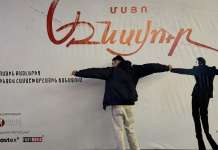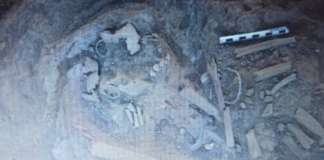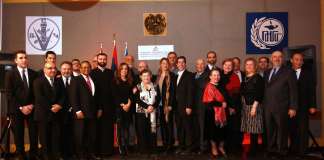NEIL HAUER
METSAMOR, ARMENIA
SPECIAL TO THE GLOBE AND MAIL
PUBLISHED MAY 3, 2021
Last year, 44 days of war over the Nagorno-Karabakh region forced tens of thousands from their homes. A Canadian’s charity group is doing what it can to help them start over
It’s a sunny spring day in the town of Metsamor, about 45 minutes west of Armenia’s capital, Yerevan. In a parking lot in the centre of town, volunteers are unloading boxes from a car adorned with the flag of the Republic of Artsakh – an unrecognized state whose territory is recognized as part of Armenia’s neighbour, Azerbaijan.
“We’ve got enough here for about 40 families,” says Haik Kazarian, the group’s organizer. Soon people begin to arrive, collecting boxes filled with enough dry ingredients (rice, pasta, buckwheat), cooking oil and tomato paste to feed a family of six for a week. Only a few boxes are left three hours later.
The families gathering here are all refugees – some of the 75,000 people displaced as a result of last year’s brutal 44-day war between Armenia and Azerbaijan over the disputed territory of Nagorno-Karabakh (or, as it’s known to Armenians, Artsakh). Mr. Kazarian, a Canadian Armenian, and his Transparent Armenia charitable foundation have become one of the leading aid organizations providing help.
Mr. Kazarian was born in 1988 in Yerevan, then part of the Soviet Union, to highly educated parents: His father is a geologist and his mother a linguist. The family emigrated to Canada in 1994, settling in Montreal just after the end of the First Karabakh War (1991-94), one of the most devastating conflicts that emerged from the Soviet collapse.
Returning to his homeland was always a question of when, not if, for Mr. Kazarian.
“I came back [to Armenia] for the first time in 2003,” he said. “It was on that trip that I decided that one day I’d move back here permanently.” He visited another eight times in the decade that followed, spending every bit of vacation time to do so.
Before he could make the move for good though, Mr. Kazarian wanted to have employment secured. “I didn’t want to come back and just take somebody’s job,” he says. That opportunity came in January 2018. “I was already working full-time from home in Canada. I decided it would be stupid to just sit at home when I could spend six times less money doing it in Armenia. So I bought a plane ticket with a return trip six months later, to give myself half a year to see if it works out.”
He didn’t even need that much time. “Three months in, I decided I’m not going back,” Mr. Kazarian says. “I had a ’tearing-up-the-ticket’ party, where I printed out copies of my return ticket for my friends and we all ripped them up to celebrate my repatriation.”
The next two years passed quickly as he settled into a quiet life in a Yerevan suburb. He focused on his work as a business consultant, helping local and international firms streamline their operations. Then, last fall, his life – and those of all Armenians – changed drastically.
The First Karabakh War ended in 1994 with a tense ceasefire that enshrined Armenia’s military victory on the ground, but left its adversary Azerbaijan aggrieved at the outcome. The intervening years failed to produce a lasting peace deal, and Azerbaijan spent the past decade overhauling and upgrading its army with billions of dollars of modern weaponry. Then, on September 27, 2020, Azerbaijan struck, launching a full-scale assault to seize control of Karabakh and put an end to the breakaway Armenian Republic of Artsakh.
When war came, Mr. Kazarian’s first instinct was to help in the most direct way, by fighting in the front lines. “I went to enlist on the first day of the war, but with my lack of experience the recruiting officers strongly advised against it,” he says.
“They said to me, ‘You can help better in other ways. You’re from Canada, why not raise some money from your friends there?’ That’s how it started.”
The next day, Mr. Kazarian founded Transparent Armenia. “There were lots of people [in both Armenia and the diaspora] donating to aid charities, but many of them wanted to see where their money was going,” he says. “That’s the group we attracted.”
Transparent Armenia’s model is based upon showing each donor exactly where their money is going. Individuals are able to see the type and quantity of supplies purchased, as well as the family their aid is going to. “It creates a connection between the donor and the recipients – it makes [donating] a much more personal experience,” Mr. Kazarian says.
The strategy quickly proved effective. Within weeks, Mr. Kazarian and his organization were helping hundreds, with the aid of more than 120 different volunteers over the group’s lifespan. Financial donations to date total $74,000, Mr. Kazarian says, with another $150,000 of in-kind donations, including 20 tons of winter clothing from a Swedish charity, A Demand for Action.
By the peak of Transparent Armenia’s operations in early November, the group was aiding more than 300 families a day. In total, it has now fed 40,000 people – more than half of all Armenian refugees from Karabakh.
Meeting with the recipients, it doesn’t take long to see how helpful the aid is – and how grateful they are for it.
At the Metsamor collection point, the Minasyan family has pulled up in a red Lada. The son, 20-year-old Minas, is a veteran of the conflict – he fought from the first day of the war to the last, including weeks in the sectors with the hardest fighting. His hometown, and the Minasyan family farm, was captured by Azerbaijani forces in late October.
Minas’ mother, 48-year-old Tamara, shares photos of their old farmstead in the Zangilan district, now lost forever.
“We are simple people, but we had a good life there,” she says with a sigh. “Now it’s with the enemy.”
The Minasyans, who relocated to a village near Metsamor in October, learned of Transparent Armenia through Facebook. They signed up for a donation and received a text message telling them to come today to collect it.
“We are so, so thankful for him [Kazarian],” Ms. Minasyan says.
Other refugees are living in a disused Soviet-era hotel nearby. The Aleksanyan family sits four to a room in the dilapidated structure. Their home village in Karabakh, Nor Aygestan, was also lost, handed over to Azerbaijan as part of the ceasefire terms.
Aleksandr Aleksanyan, the 62-year old patriarch, is missing a leg from the first war, where he fought on the frontlines. His two daughters are married to a pair of brothers; one of them – 33-year old Shamo Avanesyan – was killed on the first day of the recent war. His portrait stands surrounded by flowers on the mantle of the family’s main room.
“We have been [in Metsamor] for six months now,” says Mr. Aleksanyan, who came with his grandchildren on September 28. “My [surviving] son-in-law wants to go back [to Karabakh] and re-establish his family there, but I have to stay here. My [widowed] daughter and her children need me,” he says. “Thank God there are people like [Kazarian] in this world.”
With the day’s deliveries complete, Mr. Kazarian and his small team pack up what’s left to head back to Yerevan. His organization is already looking to the future. They have plans to fund small-scale agriculture initiatives to provide displaced families in the region with the land, livestock and other resources they need to get back on their feet and live sustainably. “We can only give so much fish – now we have to teach [people] to fish themselves,” Mr. Kazarian says.













